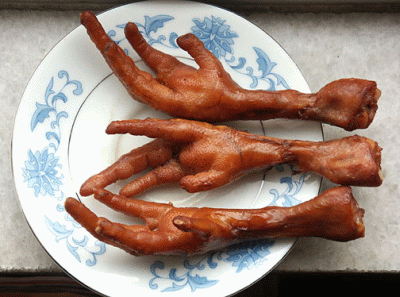
What's
so lucrative about selling chicken to China? We sell them
parts
of the bird that we won’t eat - like the feet. Worth just a
few cents
a pound in the U.S., American chicken feet fetch 60-80
cents a
pound in China.
Xinjingbao, People's Republic of China
On Trade, China Must
Target Conservative U.S. Democrats
So how can
Beijing prevent the United States from raising trade barriers? For China's
state-controlled Xinjingbao [Beijing News], researcher Xue Chung
suggests targeting conservative Democrats in the U.S. Congress who come from agricultural
states.
By Xue Chung [薛涌]
Translated by Jimmy Chow
October 6, 2009
People's Republic of China - Xinjingbao -
Original Article (Chinese)
Not long ago, the Ministry of
Commerce announced the launch of an investigation into U.S. exports of chicken
and auto parts destined for China. The case involves what are known as "white-feather
broilers."
So how important is chicken
to Sino-U.S. trade? According to data from the Ministry of Commerce, in 2008 China
imported 790,000 tons of chicken meat and other poultry products from the rest
of the world, of which 580,000 tons came from the United States. Recent
statistics show that in the first six months of 2009, 89 percent of China’s
chicken imports came from the U.S., up from 73 percent during the same period in
2008. And from a recent report
in The New York Times, we learn that the U.S. is a major
exporter of chicken. Last year, poultry exports were valued at more than $4.3
billion, of which more than $850 million were chicken meat exports to China, accounting
for 2 percent of the U.S. chicken industry. This might not seem like much, but in
the long term it could have important strategic significance for the expansion of
the U.S. agricultural market.
It may well be said that $850
million of total exports is insignificant to U.S.-China trade. However, this is
probably the most lucrative part of America's chicken export business. Here,
the profit is mainly a function of differing tastes and preferences in the two
countries.
Americans prefer breast meat,
which is the most expensive part of the chicken. In addition to eating habits and
cooking methods, this is also due to health considerations. Because it's leaner,
Americans regard breast meat as healthier. Chinese, on the other hand, find
breast meat too chewy, preferring instead the feet and wings - for which there
is no market at all in the United States. For example, chicken feet and wings
sell for just a few cents per pound on the U.S. market, whereas in China they go
for 60-80 cents a pound - the highest price in the world. Moreover, it is precisely
because American chicken breasts are expensive that the largest varieties of chicken
are raised there. Feet from such large birds are particularly well-received by
Chinese consumers.
Feed prices in the U.S. have
remained high, and with the economic downturn, the amount of chicken being sold
in restaurants has been declining, creating a great need for overseas markets. More
importantly, the potential for U.S. chicken sales to China is great. In China, the
number of "meat-eaters" has been growing very quickly, unlike in
developed countries where a saturation point has been reached. China could
become the biggest overseas market for U.S. chicken - and that's no
exaggeration. The problem is that the American public isn't familiar with this prospect.
All people see is that this is only $850 million in exports and that it wouldn’t
be sorely missed. So if there's a trade war, Americans won’t feel like they're
losing out on much.
Posted
by WORLDMEETS.US
So it's on this point that we
should focus our efforts. For example, we can concentrate on a few key votes in
Congress - those whose states have the greatest potential for exporting to China,
and by making this clear to the electorate in those states so that they realize
how fruitful free trade between the U.S. and China could be for them.
As a result, when
Congress votes, there will be more lawmakers sympathetic to China. Some critics
have said that the styles of Bush and Obama are totally different. George W. Bush
acted like a king when he was president; Obama, on the other hand, acts like a
legislative leader, and has great influence in Congress. For health care reform
to pass he's depending on the support of conservative Democrats - and these are
the ones with the strongest views on trade protection. They may demand that
Obama raise trade barriers in return for their support on health care reform. However,
these people are also from agricultural states. Their jobs, particularly the
jobs of their electorates, will be greatly impacted by the future smooth
flow of Sino-U.S. trade.
CLICK HERE FOR CHINESE VERSION
[Posted
by WORLDMEETS.US October 11, 12:02am]